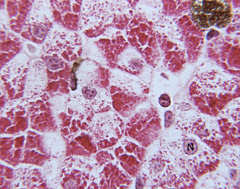Glycogen is produced in the liver from glucose. And it is
 stored in the liver, as well as in the muscle where it is available for immediate use as energy.
stored in the liver, as well as in the muscle where it is available for immediate use as energy. Both liver and the muscles can store only a limited amount of glycogen; therefore, when an excess of carbohydrates is ingested, there will be a tendency to develop an excess of glycogen.
The excess carbohydrates will then be converted to fat and stored in body as fat.
The body maintains equilibrium between glucose, the energy-producing sugar, and glycogen, which can be converted to glucose as the glucose in the blood used up to produce energy.
The production of energy from glucose involves oxidation of sugar with the release of water and carbon dioxide, which are easily removed from the body.
Glycogen




